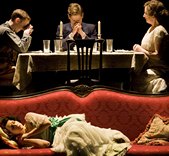SITE GUIDE
SEARCH
REVIEWS
REVIEW ARCHIVES
ADVERTISING AT CURTAINUP
FEATURES
NEWS
Etcetera and
Short Term Listings
LISTINGS
Broadway
Off-Broadway
NYC Restaurants
BOOKS and CDs
OTHER PLACES
Berkshires
London
California
New Jersey
DC
Connecticut
Philadelphia
Elsewhere
QUOTES
TKTS
PLAYWRIGHTS' ALBUMS
LETTERS TO EDITOR
FILM
LINKS
MISCELLANEOUS
Free Updates
Masthead
Writing for Us
A CurtainUp  London Review
London Review
 London Review
London ReviewThe Glass Menagerie
by Neil Dowden
|
The play is a memory, it is dimly lighted, it is sentimental, it is not realistic. — Tom
|

Sinéad Matthews as Laura Wingfield, Leo Bill as Tom Wingfield,
Kyle Soller as Jim O.Connor and Deborah Findlay as Amanda Wingfield (Photo: Simon Annand ) |
Although almost all Williams.s plays arose out of first-hand experience, the Wingfield family.s life in a St Louis tenement bears such a strong resemblance to his own background that it seems to have an especially personal significance. Tom (Leo Bill), part-narrator and part-participant, is clearly a self-portrait of a budding writer desperate to escape from home, but emotionally tied to his overbearing mother Amanda (Deborah Findlay) and vulnerable sister Laura (Sinéad Matthews).
With the head of the family having abandoned them years ago, the three live in straitened circumstances, close-knit but claustrophobic, each with their own individual dreams. Fading Southern belle Amanda reminisces nostalgically about her gracious upbringing when on one day she received 17 gentlemen callers, until she married the wrong man, but now she has to find a husband for her shy, lame daughter, who prefers to lose herself in a world of romantic Vitrola records and her collection of glass animals. When Tom finally brings warehouse colleague Jim (Kyle Soller) home for dinner to meet Laura, illusion and reality collide with devastating effect.
As Tom tells us directly at the start, this is a "memory play", and everything we see enacted is filtered through his guilty, creative consciousness, as if it was a form of therapy or expiation. Joe Hill-Gibbins.s production emphasizes the non-naturalistic aspects of the drama, with Tom orchestrating proceedings, gesturing up the red velvet curtains around the stage like a magician.s conjuring trick and signalling to the musicians to play, while confiding to the audience.
Jeremy Herbert.s split-level design, with the brickwork and fire escapes of the auditorium exposed, dining table raised theatrically on a platform and large photograph of the jaunty but unreliable absentee husband/father staring down from the wall, contributes to this expressionist mood. James Farncombe.s strobe lighting and spotlighting of the glass menagerie also suggest a dreamy, unreal quality, while Dario Marianelli.s evocative score, Eliza McCarthy.s lush piano-playing and Simon Allen.s imaginative percussion (including the use of wine glasses) add much to the atmosphere.
The show takes a while to warm up, with some of the staging seeming over-fussy and performances rather strained, but when it does engage us emotionally we become entranced in Williams.s spell. Bill.s Tom is champing at the bit, angry and sardonic, but loath to emulate his father.s desertion. Findlay may seem too robust for the role of Amanda but her domineering interference is offset by a sense of a single parent struggling to do the best for her children. Matthews gives Laura a naive fragility which (like her beloved glass unicorn) could easily crack, while Soller.s Jim is full of upbeat, probably deluded ambitions — their extended climactic scene together is the highlight of the evening.
|
Subscribe to our FREE email updates with a note from editor Elyse Sommer about additions to the website -- with main page hot links to the latest features posted at our numerous locations. To subscribe,
E-mail: esommer@curtainup.comesommer@curtainup.com
put SUBSCRIBE CURTAINUP EMAIL UPDATE in the subject line and your full name and email address in the body of the message -- if you can spare a minute, tell us how you came to CurtainUp and from what part of the country. |
| The Glass Menagerie
Written by Tennessee Williams Directed by Joe Hill-Gibbins Starring: Leo Bill, Deborah Findlay, Sinéad Matthews, Kyle Soller Design: Jeremy Herbert Costume: Laura Hopkins Sound: Mike Walker Choreography: Arthur Pita Lighting: James Farncombe Music: Dario Marianelli Presented by special arrangement with The University of the South, Sewanee, Tennessee. Running time: Two hours 45 minutes with an interval Box Office: 020 7922 2922 Booking to 1st January 2011 Reviewed by Neil Dowden based on November 17th performance at the Young Vic Theatre, 66 The Cut, SE1 8LZ (Rail/Tube: Waterloo) |
|
REVIEW FEEDBACK Highlight one of the responses below and click "copy" or"CTRL+C"
Paste the highlighted text into the subject line (CTRL+ V): Feel free to add detailed comments in the body of the email . . . also the names and emails of any friends to whom you'd like us to forward a copy of this review. |
|
London Theatre Tickets Lion King Tickets Billy Elliot Tickets Mighty Boosh Tickets Mamma Mia Tickets We Will Rock You Tickets Theatre Tickets |




